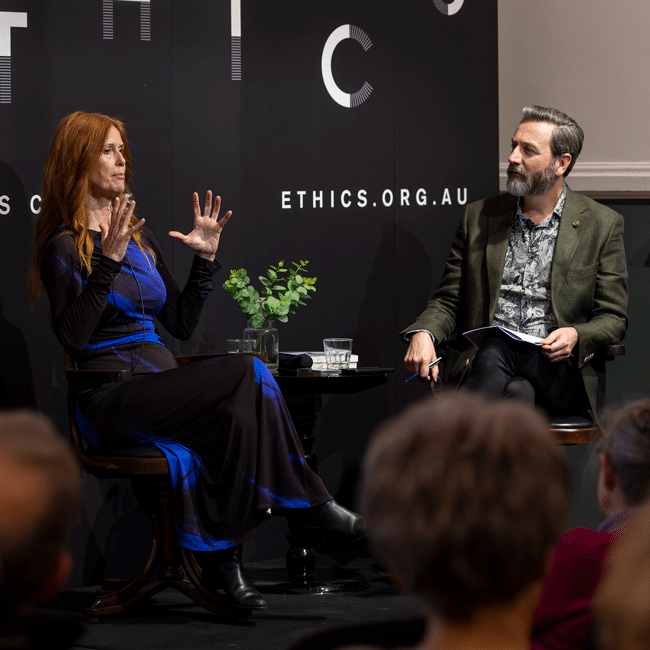
Teachers, moral injury and a cry for fierce compassion
Opinion + AnalysisHealth + WellbeingBusiness + Leadership
BY Lee-Anne Courtney 20 OCT 2025
I first came across the term moral injury during a work break, scrolling through Bond University’s research page, my casual employer at the time.
It sounded vaguely religious and a bit dramatic, and it sparked my curiosity. The article explained that moral injury is a term given to a form of psychological trauma experienced when someone is exposed to events that violate or transgress their deeply held beliefs of right and wrong, leading to biopsychosocial suffering.
First used in relation to military service, moral injury was coined by military psychiatrist Jonathan Shay (2014) when he realised that therapy designed to treat post-traumatic stress disorder (PTSD) wasn’t effective for all service members. Shay used the term moral injury to describe a deeper wound carried by his patients, not from fear for their physical safety, but from violating their own morals or having them violated by leaders. The suffering experienced from exposure to violence was compounded by the damage to their identity and feeling like they’d lost their worth or goodness in the eyes of society and themselves. Insight into this hidden cost of trauma was an epiphany for me.
I’m a secondary teacher by profession, but I’ve not been employed in the classroom for over 10 years. In fact, I haven’t been employed doing anything other than the occasional casual project since that time. Why? Was it burnout, stress, compassion fatigue, lack of resilience, or the ever-handy catch-all, poor mental health? No matter which explanation I considered, the result was the same: a growing sense of personal failure and creeping doubt about whether I’m cut out for any kind of paid work. Being introduced to the term moral injury was like turning a kaleidoscope; all the same colours tumbled into a dazzlingly different pattern. It gave me a fresh lens through which to view my painful experience of leaving the teaching profession. I needed to know more about moral injury, not only for myself, but also for my colleagues, the students and the profession that I love.
If just a glimpse of moral injury gave me hope that my distress in my role as a teacher wasn’t simply personal failure, imagine the impact a deep, shared understanding could have on our education system and wider community.
Within the month, I had written and submitted a research proposal to empirically investigate the impact of moral injury on teacher wellbeing in Australia.
I discovered moral injury, while well-studied in various workforce populations, had received limited but significant empirical attention in the teaching profession. My research clearly showed that moral injury has a serious negative impact on teachers’ wellbeing and professional function. Crucially, it offered insight into why many teachers were experiencing intense psychological distress and a growing urge to leave the profession, even when poor working conditions and eroding public respect were the subject of policy and practice reform.
What makes an event or situation potentially morally injurious is when it transgresses a deeply held value or belief about what is right or wrong. Research exploring moral injury in the teaching practice suggests that teachers hold shared values and beliefs about what good teaching means. Education researchers such as Thomas Albright, Lisa Gonzalves, Ellis Reid and Meira Levinson affirm that teachers aim to guide all students in gaining knowledge and skills while shaping their thinking and behaviour with an awareness of right and wrong, promoting social justice and challenging injustice. Researcher Yibing Quek highlights the development of respectful, critical thinking as a core educational goal that supports students in navigating life’s challenges. Scholars such as Erin Sugrue, Rachel Briggs, and L. Callid Keef-Perry emphasise that the goals of education are only achievable through relationships rooted in deep care, where teachers are responsive to students’ complex learning and wellbeing needs and attuned to ethical dilemmas requiring both compassion and justice. Though ethical dilemmas are inherent in teaching, researcher Dana Cohen-Lissman argues that many are generated from externally imposed policies, potentially leading to moral injury among teachers.
Studies assert that teachers experience moral injury when systemic barriers and practice arrangements keep them from aligning their actions with their professional identity, educational goals, and core teaching values. Teachers exposed to the shortcomings of education and other systems often feel they are complicit in the harm inflicted on students. Researchers have consistently identified neoliberalism, social and educational inequities, racism, and student trauma as key factors contributing to experiences that lead to moral injury for teachers. These systemic problems place crippling pressure on individual teachers, both in the classroom and in leadership, to achieve the stated goals of education, despite policies that provide insufficient and unevenly distributed resources to do so.
Furthermore, the high-stakes accountability demanded of individual employees fails to recognise the collective, community-oriented, interdependent nature of the work of teaching. The problem is that the gap between what is expected of teachers and what they can do is often blamed on them, and over time, they start to believe it of themselves. Naturally, these morally injurious experiences cause emotional distress, hinder job performance, and gradually erode teachers’ wellbeing and job satisfaction.
Experiencing moral distress, witnessing harm to children, feeling betrayed by policymakers and the public, powerless to make meaningful change, and working without the rewards of service, teachers face difficult choices. They can respond to moral injury by quietly resisting, speaking out to demand understanding and systemic change or take what they believe to be the only ethical choice – leave the profession of teaching. But what if, instead of facing these difficult choices, teachers resorted to reductive moral reasoning – simplifying the complex ethical dilemmas piling up around them or ignoring them altogether – so they wouldn’t be disturbed by them? Numbing ethical sensitivity just to keep a job creates even more problems.
Moral injury goes beyond personal failure or inadequacy; it acknowledges the broader systemic conditions that place teachers in situations where their ethical commitments increasingly clash with the neoliberal forces currently shaping education. Moral injury offers a language of lament, an explanation for the anguish experienced in the practice of teaching. An understanding of moral injury in the education sector invites society, collectively, to offer teachers fierce compassion and moral repair by restructuring the social systems that create these conditions. Adding moral injury to the discourse around teacher shortages may even help teachers offer fierce compassion to themselves. It did for me.

BY Lee-Anne Courtney
Lee-Anne Courtney is a secondary teacher with over 30 years of experience in the education sector. She is conducting PhD research with a team at Bond University aimed at uncovering the impact of moral injury on teacher wellbeing in Australia.
Ethics in your inbox.
Get the latest inspiration, intelligence, events & more.
By signing up you agree to our privacy policy
You might be interested in…
Opinion + Analysis
Science + Technology, Business + Leadership
3 things we learnt from The Ethics of AI
Opinion + Analysis
Health + Wellbeing
The moral life is more than carrots and sticks
Opinion + Analysis
Health + Wellbeing
The road back to the rust belt
Opinion + Analysis
Science + Technology, Business + Leadership




